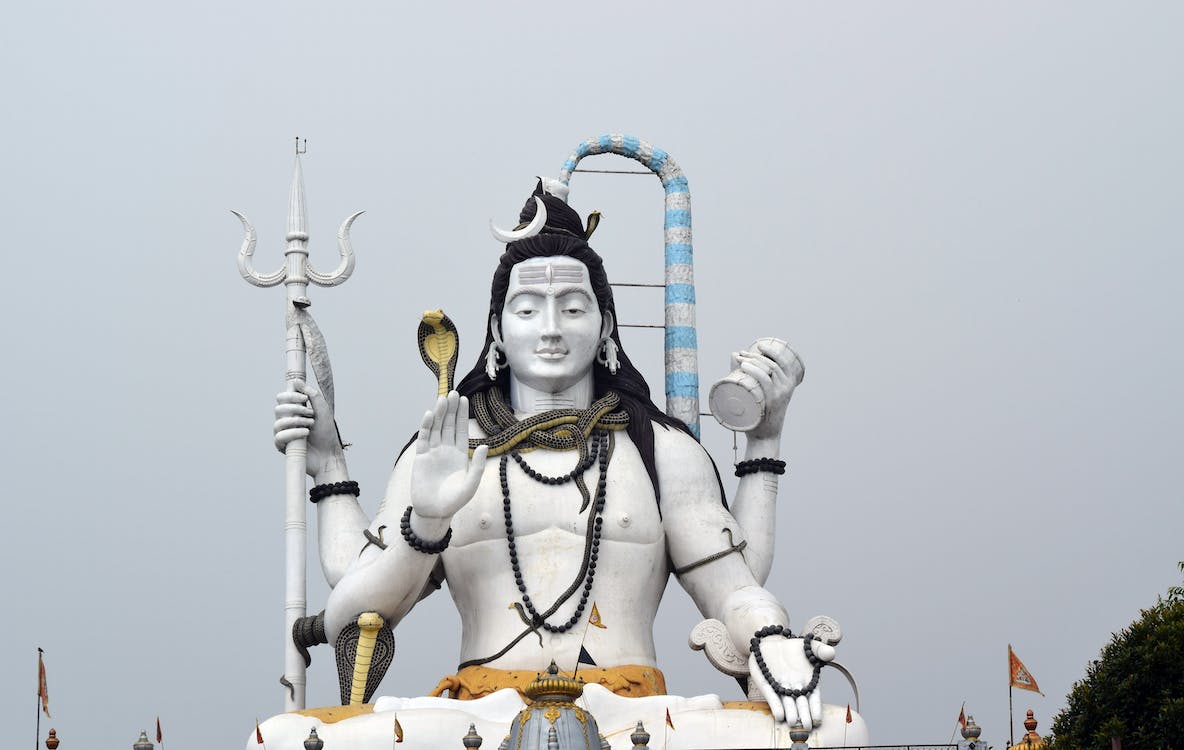
Spirituality
108 Names of Lord Shiva-Part 4
Imagine trying to describe something that has no beginning and no end – that’s Lord Shiva for you. It’s like trying to fit the universe into a single word or even a thousand words. People who love and worship Shiv have always faced this challenge. How do you capture the enormity of something so eternal in just a name or even many names?
But here’s the fascinating part – Lord Shiva is beyond counting. There are endless names for him. And here’s the beauty of it all – he’s easily pleased. It doesn’t matter which name his devotees call him by; he responds to each one with the same boundless love. In this blog series, let’s dive into the simplicity and depth of Lord Shiva’s 108 names, each revealing a piece of the timeless divinity that goes beyond what our minds can grasp.
Join us on this journey as we explore the mystical realm of Lord Shiva and uncover the profound meanings behind his countless names.
82) Shambho: The auspicious one – Shambho represents Shiva as the source of all auspiciousness, radiating divine blessings and benevolence to those who invoke his sacred name.
83) Shankara: Lord of All Gods – Shankara portrays Shiva as the revered deity above all gods, embodying the ultimate cosmic authority and divine supremacy.
84) Shantah: Peaceful Lord – Shantah signifies Shiva’s tranquil and serene nature, offering a haven of peace to those who seek solace in the midst of life’s challenges.
85) Shoolin: One who has a trident – Shoolin symbolizes Shiva’s wielded trident, representing his authority over destruction and transformation, emphasizing the cyclical nature of existence.
86) Shreshhtha: Always pure – Shreshhtha underscores Shiva’s perpetual purity, signifying a divine essence untouched by impurities and untainted by worldly influences.
87) Shrikantha: One who has a pure body – Shrikantha represents Shiva’s sacred body, emphasizing its innate purity and divine radiance that transcends the limitations of the material world.
88) Harihara: In ancient texts, Shiva and Vishnu declare themselves as one, emphasizing the unity between them. Harihara signifies a harmonious amalgamation of Shiva and Vishnu in a singular, transcendent form, urging devotees not to distinguish between these divine entities.
89) Shrutiprakasha: Illuminator of the Vedas – Shrutiprakasha signifies Shiva as the enlightener of the Vedas, illuminating the sacred scriptures with divine wisdom and cosmic knowledge.
90) Skandaguru: Perceptor of Skanda – Skandaguru represents Shiva as the spiritual guide and mentor of Skanda, embodying the role of a divine teacher imparting wisdom to the revered deity.
91) Someshwara: Lord of the Moon – Someshwara portrays Shiva as the master of the moon, symbolizing his control over time and cycles while radiating a soothing and calming influence.
92) Sukhada: The giver of joy – Sukhada signifies Shiva as the bestower of joy and happiness, spreading divine bliss to those who connect with his benevolent energy.
93) Swayambhu: Self-created – Swayambhu emphasizes Shiva’s self-originating nature, highlighting his existence beyond external influences and reinforcing his status as the uncreated deity.
94) Tejaswani: One who spreads illumination – Tejaswani represents Shiva as the bearer of divine light, spreading enlightenment and spiritual illumination to dispel the darkness of ignorance.
95) Trilochana: Three-eyed Lord – Trilochana symbolizes Shiva’s third eye, representing inner vision, intuition, and the ability to perceive truths beyond the physical realm.
96) Trilokpati: Master of all three worlds – Trilokpati signifies Shiva’s lordship over the three realms—physical, astral, and celestial—establishing his all-encompassing authority.
97) Tripurari: Destroyer of the “Tripur” – Tripurari embodies Shiva’s role as the vanquisher of the three planets created by Asuras, signifying his power to overcome cosmic challenges.
98) Trishoolin: One who has a trident in his hands – Trishoolin emphasizes Shiva’s mastery over destruction and transformation, wielding a trident to maintain cosmic balance and order.
99) Umapati: Consort of Uma – Umapati signifies Shiva as the beloved consort of Uma, highlighting the divine union and cosmic harmony between masculine and feminine energies.
100) Vachaspati: Lord of Speech – Vachaspati portrays Shiva as the master of speech, embodying the essence of divine communication and eloquence.
101) Vajrahasta: One who has a thunderbolt in his hands – Vajrahasta symbolizes Shiva’s wielding of a thunderbolt, representing his formidable power and ability to overcome obstacles.
102) Varada: Granter of Boons – Varada signifies Shiva as the benevolent granter of wishes and boons, bestowing divine blessings upon his devotees.
103) Vedakarta: Originator of the Vedas – Vedakarta represents Shiva as the source and originator of the Vedas, illuminating the sacred scriptures with divine wisdom and cosmic knowledge.
104) Veerabhadra: Supreme Lord of the Nether World – Veerabhadra symbolizes Shiva’s manifestation as the mighty and supreme Lord ruling over the netherworld.
105) Vishalaksha: Wide-eyed Lord – Vishalaksha represents Shiva with wide-open eyes, symbolizing his vigilant and all-encompassing awareness of the cosmic order.
106) Vishveshwara: Lord of the Universe – Vishveshwara signifies Shiva’s universal lordship, emphasizing his sovereignty and divine rulership over the entire universe.
107) Vishwanath: Master of the Universe – Vishwanath portrays Shiva as the ultimate master and guardian of the universe, symbolizing his cosmic authority and divine stewardship.
108) Vrisha Vahana: One who has the bull as his vehicle – Vrisha Vahana symbolizes Shiva’s association with the bull, Nandi, representing strength, purity, and divine companionship.
That concludes our exploration of the 108 divine names of Lord Shiva. Remember, regardless of the name you invoke, Lord Shiva responds with utmost love, devotion, selflessness, and pure intentions. Approach him like a child calling their mother, and may your connection with Lord Shiva deepen, bringing blessings and spiritual fulfillment into your life.
Har Har Mahadev!!!
Please subscribe to our mailing list to stay connected and receive spiritual information. In case of any queries, please write to us at info@chamundaswamiji.com. You can check out our YouTube channel Chamunda Swamiji where you can learn Tantra, Mantra, Yantra, and Meditation from His Holiness Shri Chamunda Swamiji. If you seek to learn Shakti Kriya, please register with us, and we will get back to you.
Post a Comment
-
Subscribe to Our Blog
-
Categories
-
Popular Articles
- Dead moth in the house. What universe is trying to tell you?
- Vivah Bandhan Curse – What Is It and How to Spiritually Heal It.
- Tripura Sundari | The Dasa Mahavidya
- What are Beej Mantras?
- The Dasa Mahavidyas
- Ramakrishna Paramhansa – The Man who almost became a Woman
- Maa Bhuvaneshwari | The Dasa Mahavidyas
- How does the Moon Affect Us?
- Maa Chinnamasta | The Dasa Mahavidyas
- Maa Bhairavi | The Dasa Mahavidyas



